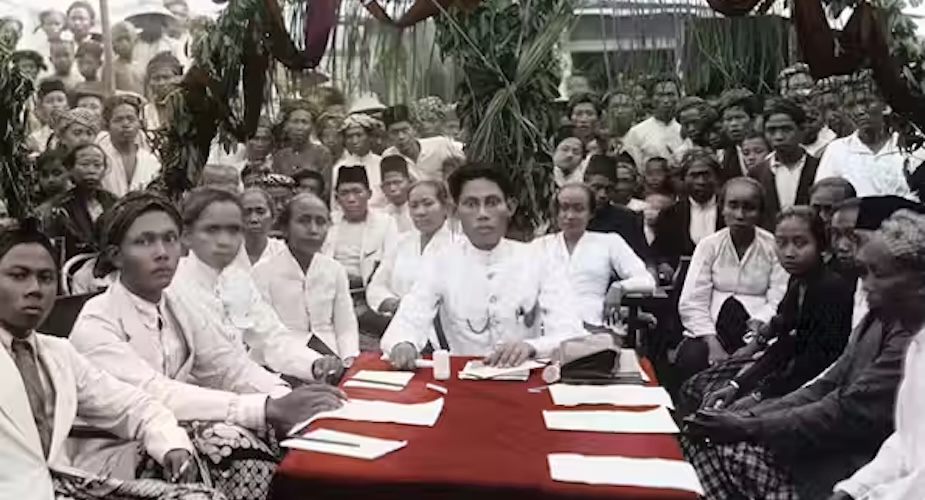Indonesia’s premier university needs to take action to improve facilities for disabled students
Eva Rahmi Kasim
A harder road than it should beDirectorate General for Rehabilitation and Social Services, Ministry of Social Affairs |
Since it moved to a new campus at Depok outside Jakarta in 1987, the prestigious University of Indonesia (UI) has had several opportunities to design buildings accessible to all, and to implement policies which provide for people with disabilities. Yet disabled students and staff are still waiting for changes which will ensure they can function like other members of the university.
Disabled students on campus
UI is famous in Indonesia for its excellent facilities, equipment, and teaching staff. As a result, many people set their sights on studying there. Among them are many people with disabilities. The aspirations of these disabled people are valid: they too have the right to enrol in higher education, a right guaranteed in various laws including the 1945 Constitution.
Unfortunately, the university does not have any written policy which acknowledges the presence of disabled students or protects their rights
Every year, students with disabilities enrol at the ‘Yellow Jacket’ university, as UI is often called. Every year, their numbers are rising. The degree and type of disability they experience differs. They are and can become fully-functioning academic members of the university if they make an all-out effort, but they face many obstacles, beginning the day they register. Unfortunately, the university does not have any written policy which acknowledges the presence of disabled students or protects their rights.
My experiences
I still clearly remember the period between 1987 and early 1990 when I studied at the university’s Depok campus. The campus only opened in 1987, and many of the present facilities had not yet been built. But there was a strong family spirit in the academic community.
At this time, I lived at a student boarding house in the Pondok Cina area. It was more than one kilometre from there to where I studied, the Faculty of Social Sciences and Politics. One kilometre is not far for most people. But for a disabled person on crutches it was a long journey, and an exhausting one.
I had to plan to set out from my boarding house long before lectures began. Fortunately, I did not have to make my own way to campus every day because sometimes a kind person would stop and give me a lift. They were not always people I knew personally, but I knew they were members of the university community. Among them were students from various faculties, and even the vice-chancellor at the time, Professor Sujudi. The same thing sometimes happened when I was heading back to the boarding house. May Allah reward their kindness.
The challenges of stairs
The long walk to campus was only the beginning of the difficulties, however. Most lecture rooms were on upper floors. It was difficult to reach lecture rooms on the second and third floors. To conserve my energy I used to wait four hours or more on level three rather than go down the stairs after a morning lecture and have to go back up again for a lecture later in the day.
Occasionally, during the exam season, just before an exam began it was announced that the exam would be held in another building on level two or three. I would panic. The change meant that I needed time and energy to reach a new room. I was not given extra time. This wrecked my concentration for the exam, especially when I watched my friends setting out at a run for the new room.
Occasionally, during the exam season, just before an exam began, it was announced that the exam would be held in another building on level two or three. I would panic
In 2002 I returned to the Depok campus of UI for the first time after graduating from there in 1990. I had been invited as a visiting lecturer in the Faculty of Social Sciences and Politics. The UI campus, especially this particular faculty, had changed a great deal. There were many new buildings and the atmosphere on campus felt different. There were many people about but none of them greeted me, even when I needed help with the stairs. Luckily the department head who had invited me came to my aid, so I did not have to ask anyone for assistance. However, I still had to make an effort to reach the lecture room because there was no lift or ramp and my legs were not as strong as they used to be.
Although there had been many changes, the design of the campus buildings and lecture rooms still does not address the needs of disabled people.
Suggestions for change
It is not good enough that the university ignores the needs of those in its own community who have disabilities. It is not good enough that the university accepts disabled people as students and then allows them to wage their own battle to stay there and complete their education.
The university authorities should respond to the needs of their disabled students by formulating a written policy which all of its citizens respect. From the moment disabled students begin their registration, through to attending lectures, going to and from their accommodation right through to the completion of their studies, the university should ensure that they have easy access to all facilities. Accessibility includes things like design and arrangement of lecture rooms so that they are within easy reach of all students; lecture materials in a range of formats; examinations which are not exclusively in print form; availability of wheel-chair access to toilet facilities and so on.
The university should not view these requirements as anything unusual or special. They should be seen as a norm, something basic for accommodating the variety of needs that members of the university have. I am sure that many of the senior staff in the university have seen these kinds of facilities on the campuses overseas where they took their doctorates or masters degrees.
I have suggested to the relevant people at UI, including the Vice-Chancellor Professor Gumilar and the Dean of Social Sciences and Politics, Professor Bambang Sergy, that they should give thought to the needs of the disabled members of their academic community.
The road to make UI a disability friendly campus is still a long and tortuous one. Almost every year since 2002 I have returned to the campus as a visiting lecturer. But there has been little progress in providing access for disabled people even though the Vice-Chancellor repeatedly says that UI will be an international university and open for all. ii
Eva Rahmi Kasim (evakasim@yahoo.com) works with the Indonesian Department of Social Affairs and with the Indonesian Foundation for Caring for Children with Disabilities (Yayasan Pembinaan Anak Cacat), she is also on the boards of many organisations of disabled persons. Further information about her is available at www.evakasim.blogspot.com or www.evakasim.multiply.com












